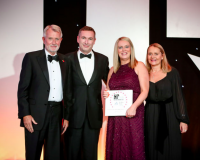Our Latest News
Learning & Development can increase top line revenue by 218%
Learning & Development can increase top line revenue by 218%
ILX’s Group’s new research reveals that up-skilling through learning and development could be the answer to business’ concerns around diminishing revenue and stagflation.
The evidence is clear, companies that align learning with the organisation’s objectives and invest in relevant skills will see improved productivity. We have seen this before, following the Dot Com bubble and the 2008 financial crisis – as the economy slows, businesses cut costs, and often there are job losses. But for the employees that remain, improved productivity is the goal; and investing in learning programmes that support the organisation’s strategy is often the key to unlocking employee productivity.
Even business that over expanded during the boom times are likely to invest in training for staff that they retain – says ILX Managing Director Russell Kenrick.
Fund managers and investors are Bearish as the market navigates its way through stagflation, with the ONS reporting a 9.6% increase in inflation on the all-item CPIH annual rate. Macroeconomic and geopolitical factors have put an end to a 127-month Bull Run, with the tech sector being hit particularly hard.
 Experts at ILX argue that developing the skillsets of existing workforces is the best way to safeguard businesses in this challenging macroeconomic environment. At a time when cost-saving innovations are necessary, skilled workers are required to implement them. And rather than absorbing the costs of a new hire, investing in existing workforces can both enable businesses to be agile in response to a turbulent financial environment, and help improve employee retention.
Experts at ILX argue that developing the skillsets of existing workforces is the best way to safeguard businesses in this challenging macroeconomic environment. At a time when cost-saving innovations are necessary, skilled workers are required to implement them. And rather than absorbing the costs of a new hire, investing in existing workforces can both enable businesses to be agile in response to a turbulent financial environment, and help improve employee retention.
Our analysis shows a strong correlation between L&D and company profitability. On average, the investment into L&D is £42bn each year in the U.K. alone, with an average spend of £1530. Companies that invest in L&D have a 24% higher profit margin than those that spend less on training, according to the Association of Talent Development, and those with comprehensive training programs also have a 218% higher income per employee.
The Great Resignation is hitting companies harder than expected with the average cost of replacing an individual employee ranging from one-half to two times the employee’s annual salary. ILX’s independent research reveals a cost of £31,375 for leadership replacement and £14,117 employees at management level. These numbers do not factor in training and on-boarding, nor do they reflect the time spent learning company processes, tools, and protocols.
Being off work sick or injured linked to higher risk of suicide
Being off work sick or injured linked to higher risk of suicide
People who are off work due to injury or illness are at higher risk of later suicide and intentional self-harm, a new international study by Monash University School of Public Health and Preventive Medicine researchers has found. They collated findings from 47 studies published over 20 years from 16 different countries, to closely examine the relationship between a disabling work injury or illness, and later suicide or self-harm.

Published in PLOS Global Public Health, the review found that the risk of suicide was elevated in people with workers’ compensation claims, on long-term sick leave and receiving disability pensions. Lead researcher Professor Alex Collie said this suggested a need for governments and employers to focus on identifying workers at greatest risk of suicide, and put more effort into suicide prevention.
“We found consistent evidence of a link between being off work sick or injured and later suicide,” Professor Collie said. “We see this link in many countries and in people with different types of health conditions.”
Of the 47 studies included in the review, 44 found that people with work injury or illness were at greater risk of suicide or self-harm. Only one study showed a protective relationship and two showed no relationship.
“Looking across all of this evidence, we also found a number of things that increase the risk of suicide, such as being off work for a long time, younger age, living alone, having a history of poor health or a mental health condition,” Professor Collie said.
People who had very long periods off work were at much higher risk. Being out of work with injury or illness for weeks, months or years was linked with a significantly increased risk of suicide and self-harm.
“But time away from work doesn’t necessarily reflect the severity of injury or illness,” Professor Collie said. “It may also indicate that the person has received poor quality medical treatment, has delayed seeking help, or has other behaviours that can affect recovery such as substance misuse.”
The review’s authors suggest that programs and services designed to reduce the duration of time off work may also reduce the risk of suicide and self-harm.
“When it comes to reducing time off work, we know what good interventions look like,” Professor Collie said. “This review adds another dimension, and suggests by supporting sick and injured workers to return to work, we may also be able to reduce the risk of suicide.”
“Suicide prevention should not be left just to the healthcare system. We have opportunities through systems that support sick and injured workers, like workers’ compensation and social security, to identify people who are at higher risk and to provide supports and services that reduce those risks.”
The researchers also identified some large gaps in the research literature. Only two Australian studies were identified, and there were no studies of suicide prevention interventions.
New research shows HR teams need to focus on retention more than recruitment
New research shows HR teams need to focus on retention more than recruitment
A new research report commissioned by global HR technology and employee engagement company, Reward Gateway calls for HR managers to include practical, human-centred solutions in their core strategy for 2023 to boost engagement. The past few years of prolonged uncertainty and disruption has had a significant impact on employees and HR leaders today. The report findings reflect this change and reveal a significant disconnect between employers and employees when it comes to engagement. A minority of employees rate the physical (32%), mental (39%) and financial (28%) wellbeing support from their employers as ‘good’ or ‘excellent’.
 However, the majority of employers believe they are excelling in this area. With over 2 in 5 employees frequently experiencing burnout, the report highlights science-based, practical strategies to boost overall wellbeing and increase employee engagement, in turn mitigating employee burnout.
However, the majority of employers believe they are excelling in this area. With over 2 in 5 employees frequently experiencing burnout, the report highlights science-based, practical strategies to boost overall wellbeing and increase employee engagement, in turn mitigating employee burnout.
The research findings of 1,015 employees and 250 HR managers in the UK show that wellbeing benefits are imperative to re-engage staff today, given that 24% of UK employees state they are no longer going above and beyond at work. Moreover, 72% of employees say that their workplace wellbeing would improve if they were simply thanked and recognised more frequently for their hard work, as a lack of recognition can trigger a sense of pointlessness at work.
Almost half of UK employees say that they frequently experience feelings of overwhelm, driven by the current ‘war for talent,’ constant adjustments to life post-pandemic, and ever-increasing inflationary pressures. With 72% of employees stating that they have felt a lasting negative effect from the last few years of constant upheaval and uncertainty, there is a clear gap in expectations for improvement when it comes to wellbeing support.
Reward Gateway’s report brings to light specific, practical ways HR managers and senior executives can re-engage their workforce in 2023, citing the four R’s: Revive, Remind, Recharge and Recognise. This framework encourages employees to think about why they decided to accept their job in the first place, and to remind them of all the benefits and support available to them beyond the paycheque.
Rob Boland, COO at Reward Gateway, says: “The findings from the report confirm that a subtle societal evolution has taken place where physical, mental and financial wellbeing in the workplace is now expected at the core of every company’s HR strategy. Our new research further suggests that employers and employees need to be connected on all fronts now more than ever, with 93% of UK employees saying that feeling heard is an important contributor to their wellbeing at work. Clearly defining the support available to all employees and ensuring that employees feel recognised and valued in the workplace is key for both financial and career wellbeing.”
This research was commissioned by Reward Gateway, whose platform enables organisations to improve employee engagement to build better, stronger and more resilient organisations.
70% of HR professionals highlight the cost of living crisis as their biggest challenge for 2023
70% of HR professionals highlight the cost of living crisis as their biggest challenge for 2023
Latest research by employment law and HR consultancy firm WorkNest, has found that 70% of HR professionals have highlighted the cost of living as their most significant challenge for 2023. This was closely followed by retention (69%) and recruitment (55%). A third of those questioned also see skills shortages (34%) as a significant HR challenge next year, and employee engagement (24%).
Echoing this, half (50%) of HR professionals believe retention will be the stage of the employee lifecycle in which they will face the most challenges in 2023, followed by recruitment (44%).
Interestingly, only 6% of HR professionals think the most significant challenges will come from in-life employee management (on-boarding and off-boarding). Yet if they could manage this better, then they could impact the high resignation rates and not need to face recruitment challenges.
 With the cost of living crisis and the repercussions this will have throughout 2023, three-quarters (75%) of HR professionals revealed that mental health and wellbeing would be the most crucial area for HR to support employees over the next 12 months.
With the cost of living crisis and the repercussions this will have throughout 2023, three-quarters (75%) of HR professionals revealed that mental health and wellbeing would be the most crucial area for HR to support employees over the next 12 months.
This was followed by performance management (50%), diversity, equality and inclusion (48%) and hybrid and flexible working (48%). Other areas also mentioned by HR professionals included financial wellbeing and cost of living.
Being efficient is essential, and HR professionals want to help streamline their processes further with secure HR platforms and having a solid budget to help them achieve their goals. Almost three in 10 (29%) respondents revealed their HR technology budget will increase in 2023, while 37% said their budget would stay the same next year.
Making the most out of employee data allows businesses to remain effective, respond to trends, and support building a high-performance culture in their organisation. According to our survey, 92% of HR professionals will be using people analytics to drive their HR strategy, yet over a third (34%) have no certainty about their tech budget for 2023.
Interestingly, almost half (49%) of HR professionals admitted they’re not looking at cost savings in their organisation, despite the majority stating that the cost-of-living crisis will be their biggest challenge next year. However, almost two in 10 (18%) HR professionals divulged that their organisations would reduce headcount to drive cost savings, and 10% were pausing recruitment.
Hannah Copeland, HR Business Partner at WorkNest commented on the results, “HR teams across the UK have a challenging year ahead. The cost of living is at the top of everyone’s mind regarding how they manage and support their employees through this difficult time. Unfortunately, many businesses will be forced to make cuts and may encounter tremendous retention and recruitment issues as employees look to improve their salaries in the face of rising costs.
“Keeping employees engaged, having regular conversations with them to understand their worries and supporting them with mental health and financial wellbeing will be critical over the next 12 months. Organisations will need to be working through robust and fair redundancy consultation and selection exercises and make sure that employees are treated with empathy and respect if they are impacted; remembering that no redundancies can be made on discriminatory grounds otherwise, they could face various legal challenges.
“The next year requires HR to be smart by being more efficient and using people analytics to find the root cause of certain issues. For example, if several resignations come from one team, question it. Were exit interviews conducted to understand why they all left? Is the line manager the common denominator here? If so, does capability need to be analysed?”
Christmas Holidays – HR Best Practice Guide
Christmas Holidays – HR Best Practice Guide
 Global employment experts Remote share their internal playbook for approaching the holiday season at work in an inclusive way that celebrates everyone in your team.
Global employment experts Remote share their internal playbook for approaching the holiday season at work in an inclusive way that celebrates everyone in your team.
The end-of-year season (and all the celebrations that come along with it) are a challenge for businesses looking to operate in a more inclusive way. While fun, for some, they are a time of stress and confusion, especially if your employees are part of a fully remote global team. Research shows that inclusivity and diversity are factors in running a successful business with a happy and empowered work culture. Efforts of inclusion extend to celebrations, particularly at the end of the year when many different cultures celebrate different holidays.
With this in mind, global employer of record Remote (which has a fully remote team of more than 900 employees spread across more than 65 countries) shares its tried-and-tested tips on how to prioritise inclusivity over the holidays.
After all, why build up a great team of people, only to leave them feeling left out during a time of togetherness?
Remote’s eight playbook tips for holiday inclusivity
- Be time-zone inclusive. If you have a global team, make sure you account for employees in different time zones who may have less coverage support than those in larger time zone locations and ensure they have a turn to take time off.
- Offer floating holidays. Not everybody celebrates the same occasions. Reflect this fact in your holiday policy by allowing your employees to choose which religious holidays they want to celebrate with paid time off.
- Create a holiday calendar. Highlight different religious, awareness, and inclusion days and events with a company-wide holiday calendar. Send out internal communications about upcoming holidays and encourage employees to share how they celebrate. Just remember — don’t disclose the beliefs of your employees in these communications yourself. If employees want to share, that is up to them.
- Recognise your employees’ preferences. Every employee is different. Some may love the buzz of an office party, while others may prefer a more relaxed event. Make sure that everyone is given a say in how they’d prefer to celebrate this holiday season, and clarify that attendance is always optional.
- Ramp up the flexibility. During the holidays, people are more likely to travel or have obligations outside of work. Flexible hours are always a good thing, but allowing team members to have more freedom in when they sign on or off can help them navigate family trips, school events, and all the other complicated planning that happens with end of year celebrations.
- Create a diverse party-planning committee. Leaving your party up to a committee can relieve some pressure. Still, you’ll need to ensure that the committee represents the diverse makeup of your business and represents the spectrum of values and beliefs within it.
- Celebrate success. Hold a party to celebrate your employees and their achievements and take a moment to reflect together. The event doesn’t have to be focused on a specific day or celebration — it’s all about the people in your business.
- Different cultures celebrate different holidays. Be mindful during the end-of-year season and don’t make any assumptions based on someone’s religion (or location) for whether they would take time off or not.
Three ground rules for every work event
- No one gets left out. It may be challenging to create events that accommodate remote and in-office workers, people from different cultures, and people who like different things, but don’t let that stop you. Inclusivity is key so, if you’re managing a hybrid or global team, have you organised an event that everyone can attend?
- Variety is the spice of life. Not everyone drinks alcohol, enjoys the same foods, or likes the same games. Give people options to ensure everyone feels welcome and send a quick poll when planning the events to see your team’s dietary and drink requirements.
- Show your appreciation. It’s not often that everyone gets to gather together to have fun, so use this opportunity to show people they are valued and appreciated. End-of-year awards are nice, but make sure everyone leaves feeling like their presence and contributions are valued.
Inclusivity is essential for business and people
If your office is lacking in diversity, or you’re yet to consider inclusivity initiatives, it’s time to question why this is. Diversity and inclusion initiatives aren’t just awesome for your employees; they’re beneficial for your business, too.
Here are some of Remote’s favourite workplace inclusivity stats:
- Studies prove that gender-diverse companies are 15% more likely to outperform their peers, and ethnically-diverse companies are 35% more likely to do the same
- Companies with more women on the board outperform their competition, and this is also true for teams with high inclusivity
- Diversity and inclusion initiatives help everyone to feel more valued in the workplace. The more valued our employees feel, the happier they are. Studies show that happier teams are 12% more productive
Of course, we shouldn’t really need all this research to get the point across. It’s more a case of applying some common sense — feeling included and respected makes us feel comfortable, and who wants to feel uncomfortable at work?
When considering the inclusivity of your work culture, examine:
- Your diversity statement. Does your business have a diversity statement written up? And is it easily accessible to the public and your staff? Do your leaders actually hold themselves accountable to diversity goals? Simply saying diversity is a priority is not enough. Businesses must back up their words with actions.
- Your company’s use of language. Words matter. Review your website or job advertisements and remove any discriminatory expressions related to race, religion, gender, class, sex, or ability. In addition, consider encouraging people from underrepresented backgrounds to apply.
- The makeup of your current workplace. Look around your office (or the next few remote meetings) — what do you see? You may have difficulty finding diverse candidates if your company is filled with people who all look alike, are the same gender, or share the same backgrounds.
By fostering a work culture where everyone’s beliefs are respected, you’re allowing your employees to bring their true selves to work. Winter is the perfect season to take stock and look back on the big wins (and challenges) of the past year. If you’re yet to reflect on the inclusivity and diversity policies of your own organisation, we couldn’t think of a better time to change that.

































